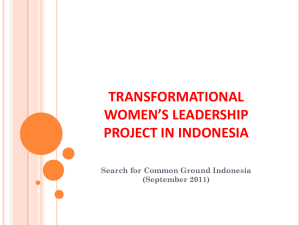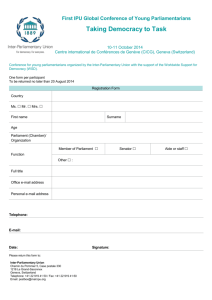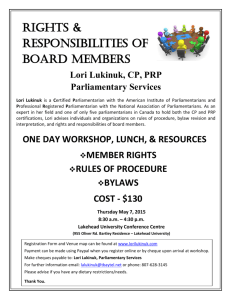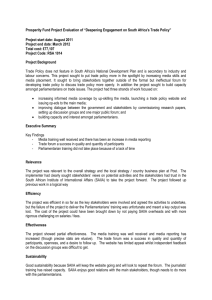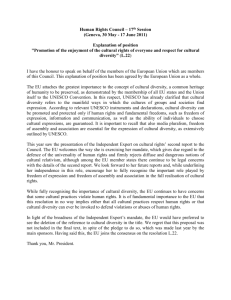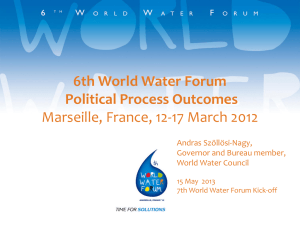Peserta First Contact Group Meeting of Parliamentaries for education in the
advertisement
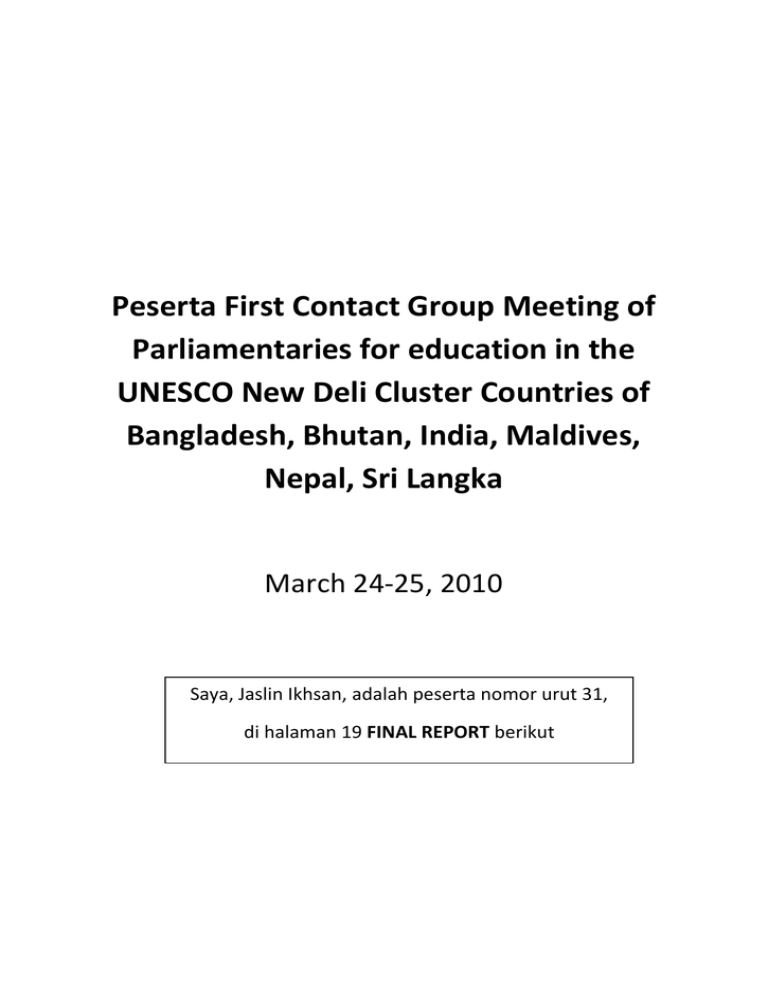
Peserta First Contact Group Meeting of Parliamentaries for education in the UNESCO New Deli Cluster Countries of Bangladesh, Bhutan, India, Maldives, Nepal, Sri Langka March 24-25, 2010 Saya, Jaslin Ikhsan, adalah peserta nomor urut 31, di halaman 19 FINAL REPORT berikut Table of Content Page Introduction 3 Inauguration 4 Election of the Bureau and Adoption of the Agenda 5 Country Presentations 6 Recommendations 12 Valedictory/Closing Session 15 Annex I: List of Participants 17 Page 2 of 21 Introduction Over the past few years and in collaboration with various development partners, UNESCO has supported the creation of networks of parliamentarians for education, as a means to advance the attainment of Education for All. Following the examples of the Forum of African Parliamentarians for Education (FAPED) and the Forum of Arab Parliamentarians for Education (FARPED), created respectively in 2002 and 2007, the Forum of Asia-Pacific Parliamentarians for Education (FASPPED) was established in October 2008 on the occasion of a constitutional meeting in Jakarta, Indonesia. In doing so, the parliamentarians from Asia-Pacific renewed their commitment towards the Jomtien Declaration on Education for All (1990), the Dakar Framework of Action (2000), and the United Nations‟ Millennium Development Goals; and reaffirmed the importance of their involvement in furthering education in the Asia Pacific region, including South Asia, which is one of the six sub-regional structures of FASPPED. As a follow-up to the constitution of FASPPED, a First Contact Group Meeting of Parliamentarians for Education was convened from 24 to 25 March 2010 in New Delhi, India, in order to establish a basis for the implement the recommendations of FASPPED in South Asia, and particularly in the UNESCO New Delhi cluster countries of Bangladesh, Bhutan, India, Maldives, Nepal and Sri Lanka. The specific objectives of the meeting were to: (i) Strengthen cooperation between UNESCO, parliamentarians and other partners on the one hand, and amongst parliamentarians on the other hand; (ii) Create for the parliamentarians of the cluster countries a space for dialogue and exchange of information on educational development issues; (iii) Brainstorm for ideas and suggestions to be considered for the elaboration of a two-year (2010-2011) action plan of parliamentarians for education in the countries of the UNESCO New Delhi Cluster for: a. The effective implementation of FASPPED‟s recommendations, and b. The strengthening of the parliamentarians‟ ability to champion EFA and educational development in the cluster countries; (iv) Explore ways of working together with FASPPED for the establishment of the FASPPED chapter for South Asia; (v) Reinforce the commitment of Parliamentarians to EFA, the MDGs and the reduction of poverty. The meeting gathered 57 participants from Bangladesh, Bhutan, India, Maldives, Nepal and Sri Lanka as well as representatives from FASPPED and FAPED; the Indian Association of Parliamentarians for Population and Development (IAPPD); the Indira Gandhi National Open University (IGNOU); The National University of Educational Planning and Administration Page 3 of 21 (NUEPA); the Commonwealth of Learning (COL); UNDP Maldives; Office of the UN Resident Coordinator in India; the United Nations Office on Drugs and Crimes (UNODC); World Bank India; UNICEF Bangladesh, India and Nepal; UNESCO Bangkok, UNESCO New Delhi Office and UNESCO Kathmandu. The list of participants is attached as annex I. The meeting was made possible thanks to the support of the Government of India, UNESCO, UNDP, UNICEF and the World Bank. The present report summarizes the proceedings and delivers the conclusions of the meeting. Wednesday, 24 March 2010 I. Inauguration The inauguration took place at the Ashok Hotel in New Delhi, India by H.E. Shri Kapil Sibal, Minister of Human Resource Development, Government of India and in presence of an important delegation from the House of the Republic of Indonesia representing the Speaker of the Parliament of Indonesia and President of FASPPED, the diplomatic corps representing the participating countries, the parliamentarians, representatives of member organizations of the United Nations system, and other development partners. The following addresses were delivered by the following personalities: (i) Welcome and Opening Remarks by Mr. Armoogum Parsuramen, Director UNESCO New Delhi Cluster Office and Representative to India, Bhutan, Maldives, and Sri Lanka (ii) Address on behalf of the United Nations system by Mr. Arun Kashyap, Officer-In-Charge, United Nations Development Program, Maldives (iii)Address by Hon. Dr. Nurhayati Ali Assegaf, MP, M.Si. and Representative of Honorable (Mr.) Marzuki Alie, SE, MM, President of the Forum of Asia-Pacific Parliamentarians for Education (FASPPED) and Speaker of the House of the Republic of Indonesia (iv) Inaugural Address by Chief Guest, Shri Kapil Sibal, Minister for Human Resource Development; Government of India. In their speeches, the speakers addressed a number of pressing issues. They all highlighted the importance of education as a fundamental right, a driver of development for individuals, communities and nations. H.E. Shri Kapil Sibal stressed that education is an important factor on which the future of the global economy depends. He discussed the important role of intangible assets and creativity in the future global economy. Further, the speakers emphasized the importance of gender parity; universal access; and quality education. They further stressed the important role that Parliamentarians play in achieving these goals: as community leaders, trend setters, change agents and monitors, to ensure that government policies Page 4 of 21 and objectives are in line with EFA goals, to meet the needs and interests of the people, and to monitor that resources are distributed efficiently. A call was made by H.E. Shri Kapil Sibal to shift from an old education system based on the learning of knowledge in text books to a system that nurtures the critical sense and creative ability of students so as to address the new challenges of a global economy. To this end, the Minister noted that increased emphasis needs to be given to higher education in addition to primary and secondary education, as he presented higher education as that which nurtures this creativity. All the speakers renewed their commitment to support the work of the Parliamentarians in the South-Asia cluster. Further, the representatives of FASPPED urged the participants to attend the first General Assembly of FASSPED in July this year. II. The proceedings 1. Election of the Bureau and adoption of the agenda of the meeting The meeting elected a Bureau composed of 1 President and 5 Vice-Presidents presented as follows: President: Hon. Shri Harin Pathak, MP, Parliament of India Vice President: Hon. Mr. MD Shah Alam, MP, Parliament of Bangladesh Vice President: Hon. Nar Bahadur Gurung, MP, Parliament of Bhutan Vice President: Parliament Maldives Vice President: Hon. Prof. Dr. Mangal Siddhi Manandhar Vice President: Parliament Sri Lanka Further, each country was asked to designate one representative for the drafting of the Declaration of New Delhi. The Bureau was to be supported by the UNESCO Secretariat managing the sessions and drafting the report. The Plenary subsequently adopted the agenda of the meeting by acclamation. A copy of the agenda is annexed. 2. Working Sessions The meeting was divided into 5 Working Sessions over two days. The first session was devoted to the presentations by the participating countries. Each of the parliamentary delegations of the six UNESCO New Delhi cluster countries, including Bangladesh, Bhutan, India, Maldives, Nepal, and Sri Lanka presented and discussed the situation of education in their own countries Page 5 of 21 and provided a description of how parliamentarians are involved in their respective countries in promoting educational development. The presentations also examined, though briefly for some of them, how cooperation amongst parliamentarians on one hand and between parliamentarians and development partners, particularly UNESCO may be strengthened to support parliamentarians in the roles they play for educational development. 2.1 Country Presentations Bangladesh: After having warmly greeted the audience, the Bangladesh delegation stated in their address/presentation that South Asian countries “have more or less common sociopolitical, economic and cultural history;” that “these countries can share and exchange their views, ideas, good practices more frequently and effectively to implement UNESCO‟s programmes and activities at the grassroots level;” and that the Bangladesh Delegation hopes that the First Contact Group Meeting of the Parliamentarians for Education within the cluster “will foster further networking and collaboration among the cluster countries to achieve EFA goals, the Millennium Development Goals and overall educational development.” The Bangladesh presentation then highlighted the importance of education and the educational objectives of the Bangladesh Government, which has adopted a Comprehensive Education Policy in 2009, which includes objectives such as the “achievement of 100% enrolment by 2011, eradication of illiteracy by 2014, compulsory and free education up to twelve grades by 2013, expanding technical and vocational education from secondary level. And education up to graduation level will be provided free of cost in phases.” The presentation highlighted then the Government‟s strategy to achieve the EFA goals, the challenges facing the achievement of these goals, and the roles of parliamentarians in the pursuit of education for all. Bhutan: After having highlighted the aim of education “... as one of the fundamental needs required to achieve Gross National Happiness, which is the framework for the overall development of Bhutan,” the delegation of Bhutan discussed the history and status of education in Bhutan characterized by the achievement of a Gross Primary Enrollment Ratio of 105.7% coupled with the need for improving quality of education as well as access to children with physical disabilities. They shared the objectives and strategies undertaken by the Government of Bhutan to address adequately the challenges facing educational development in their country; and talked about the roles of Members of Parliaments in the process of promoting educational development and the challenges they face. The Bhutan delegation ended its presentation by pinpointing the importance of sharing experiences and best practices to help support parliamentarians. Page 6 of 21 India: Hon. Shri Harin Pathak in his role as representative of the delegation from India gave a speech describing the situation of education in India and the important role that parliamentarians must play in advancing EFA. He highlighted the relationship between parliamentarians and their constituencies and indicated how this relationship can better be utilized to serve the cause of Education through advocacy and the initiation and support of community projects. Maldives: The delegation from the Maldives could unfortunately not attend the meeting due to last minute unforeseen obligations at home. However, the contribution/presentation of the Maldives was delivered by the Secretary General of the Maldives National Commission for UNESCO on behalf of the parliamentary delegation. After a brief introduction of the country and the national “pledges”/policies of the new Government, the presentation discussed the status of Education in relation to the EFA goals, highlighting for each goal the achievements made, the challenges faced and Government‟s response. With respect for instance to the provision of free and compulsory education for all (goal #2), primary school access is achieved in all the islands of the country. However, the training of qualified teachers and the existence of legislation for compulsory education, and ensuring inclusion remain major challenges. Further, although gender parity has been achieved, sustainability and mindset of factions are key issues to be dealt with if the achievements in terms of gender parity in basic education in the Maldives are to be sustained. Nepal: The delegation from Nepal gave a brief introduction of Nepal and the context of Education, which is ensured by the 2007 Interim Constitution of Nepal as a fundamental right. The Nepal‟s Major Policy Focus on Education whose main thrust is to provide quality and relevant education was discussed. Major challenges include reaching the unreached, improving internal efficiency of the public school system, Ensuring access to free quality basic education for all by making it compulsory, ensuring free quality secondary education, defining and ensuring minimum enabling conditions at schools, defining and maintaining quality standards, building local capacities for education planning and management, developing and enforcing a clear accountability framework, ensuring inclusiveness in educational policy making, achieving universal literacy, gaining parents‟ confidence towards public schooling, and cooperating with Teachers‟ Unions for quality improvement. After discussing the role and constraints of parliamentarians in facing these challenges nationally, the delegation suggested specific measures to support parliamentarians such as establishing and strengthening a forum of the members of legislative parliament for education at regional, sub-regional and national levels; organizing seminars and exchange programmes frequently for sharing best practices; lobbying for mutual support among countries; strengthening cooperation and coordination amongst parliamentarians, national commissions, UNESCO field offices , UNICEF country offices and other development partners. Page 7 of 21 Sri Lanka: The delegation from Sri Lanka provided a comprehensive picture of the situation of education in Sri Lanka, and stressed that “at present, under standing order 104, the 6th parliament just dissolved had appointed a consultative committee and a sub committee on education, which was expected to meet monthly to respond to questions coming up in parliament with regard to the subject of Education.” But only two meetings of the committee were held in 2009 and questions brought before the committee dealt mostly with “operational issues of appointments, transfers of teachers and educational administrators, infrastructure, exam issues etc. There is not much focus at the parliamentary consultative committee levels on policy, research, development and on reaching the goals of education for all, which subjects are handled by the Ministry of Education and its Secretariat.” Given this, the delegation from Sri Lanka stressed that “it could be deemed most timely for an agency like UNESCO, together with its development partners, to propose and encourage quarterly progress reporting mechanisms to the parliamentary consultative committees on education, based on issues that cover delivery of quality education for all…” and that, “if UNESCO, through forums such as the Parliamentarians for Education, encourage the parliamentarians to focus on the needs of schools and quality of teaching on a regular basis through parliamentary consultative committees, much focus and attention to provide quality education for all could be achieved and the delivery mechanisms improved upon a great deal in the respective provinces and districts of the country.” All in all, the country presentations and the ensuing discussions pointed to key challenges facing EFA within the cluster and having to do mostly with issues related to: Teacher training and quality; Shortage of quality teaching/learning materials; Physical infrastructure, including quality and quantity of school buildings and facilities, Reaching the unreached; and effective use of ICT to this end; Drop out and retention; Access for people with physical disabilities; Achieving and maintaining gender parity; Adult literacy; Lack of legislation in certain countries; Page 8 of 21 Lack of societal and media awareness and support; and perhaps most importantly; Sustainability of achievements to date. In addition to the above, the importance of developing and mainstreaming innovative methodology for education for peace was highlighted by both Nepal and Sri Lanka. On the role of parliamentarians for educational development, there was a general acknowledgement, in all the country presentations, that Parliamentarians play an active role in promoting the global EFA agenda, through for example: Passing quality legislation; Mobilizing communities; Representing the concerns of the people; Advocating for the promotion of education, particularly for girls and marginalized groups; Mobilizing resources; Monitoring budgets and programmes; Promoting collaboration and cooperation between stakeholders. However, the specific challenges facing Parliamentarians vary across the cluster countries. Some such challenges include lack of focus due to diversity of issues and/or lack of financial resources. The need for access to relevant information and data for Members of Parliaments to make informed decisions is a common challenge pointed by all country presentations. This is particularly the case in countries like Bhutan, Maldives or Nepal, where the Parliament is in a nascent or transitional stage. The second session analyzed the status of Education for All in South Asia. While much has been achieved over the past 10 years, the recent Global Monitoring Report also reveals the gaps and challenges for the region. Professor R. Govinda, Vice-Chancellor of National University of Education Planning and Administration (NUEPA), made a presentation on “Education For All in South Asia: An Introduction.” In his presentation, he highlighted the progress of the region in the areas of Early Child Care and Education; Universal primary education; Developing Skills of Youth and Adults; and Adult literacy. Revealing that at the current level of progress of the cluster countries only Maldives would be close to reaching the EFA goals by 2015, he presented 8 means of accelerating the achievement of EFA in the region, namely: Page 9 of 21 (i) Increased attention for Early Child Care and Education, which plays a critical role not only in school attendance but also in strengthening children‟s cognitive capacity in later life; (ii) Focus on marginalized groups that would include rural populations; minorities; and disabled children, among others; (iii) Girl‟s education. With the exception of Bangladesh, school enrollment of girls and female literacy levels remain low; (iv) Diversifying delivering mechanisms. However, it was noted that using different means of education delivery can be problematic, and it is essential to ensure that different does not mean disparate quality standards; (v) Improving quality of education. It was pointed out that the data, both in terms of the quality of schools and the learning achievement of students, are missing. Professor Govinda also highlighted concern regarding a group of „silently excluded‟ children who attend school, but are rejected by the school system and, in turn, the communities; (vi) Investing in teachers in terms of quality and quantity. To this end, a creative mechanism to produce good teachers is required noting that there is a shortage of 2 million teachers in the region. Per capita spending on teachers in the region also remains considerably low in South Asia compared to the developed world. (vii) Enlarging the scope of education policy and programming beyond schools, for instance to invest more in mothers‟ literacy and parental involvement in school management, or to look into the impact of child labor on education (viii) Other important points included decentralization, civil society involvement; publicprivate partnership and monitoring of the use of financial resources in education sector. Professor Govinda concluded by highlighting a sense of optimism that prevails in reaching the EFA goals in the region, due to factors such as groundswell for universal primary education; increased availability of domestic resources; and the demography dividend of the region. Mr Shailendra Sigdel, Cluster Advisor for UNESCO Institute of Statistics, using the available statistical data of the region, shed light on various existing statistics and their use, and explained about the indicators that are used to monitor education development in the region. A factsheet with a set of education and other socio-economic indicators of each participating country was made available and the implication of statistics in policy decision was explained. Mr. Sigdel also talked about the methodologies and limitations of indicators. During the presentation, the Director of the UNESCO New Delhi office also mentioned that UNESCO can offer the relevant tools and technical support to the member states in this area. During the third working session, the meeting heard views, experiences and activities of institutions involved in the networking and/or capacity building of Parliamentarians. Page 10 of 21 Mr Heri Akhmadi, Representative of the Hon‟ President of the Forum of Asia Pacific Parliamentarians for Education (FASPPED) shared with us the history of the constitution of FASSPED, including the Jakarta Declaration of 2008 and its activities since then. Insights on the African experience was shared by Mr Aime Damiba of the UNESCO Dakar Office, though the example of the Forum of African Parliamentarians for Education (FAPED). Created in 2002 to take forward the Dakar Framework of Action, the Forum conducts subregional and national activities and mobilizes national parliaments to create FAPED national chapters, as well as conducting a capacity building programme. Ms Radhika Kaul Batra, Advocacy officer, United Nations Resident Coordinator‟s Office, India, provided the participants with an account of the experience of UN agencies in India in working with Parliamentarians. The Parliament of India has its own thematic fora on Education; Children; Youth; Global Warming; Population and Public Heath; and Water, respectively. The UN office supports these thematic fora by conducting activities such as producing issue briefs, arranging presentations by UN technical experts at Parliament sessions and tracking questions in parliament. In addition, the office works directly with State Legislative Assemblies, keeping MLAs informed as to the situations that concern these states. Mr Mohan Sharma and Mr. PP Talwar presented the work of the Indian Association of Parliamentarians for Population and Development (IAPPD). The association came into existence some 30 years ago, in order to accompany the Parliamentarians to implement policy decisions at the grass-roots level. It promotes population and development issues amongst parliamentarians by providing information, conducting advocacy, producing research studies and organizing workshops and inter-state and inter-country tours. Thursday, 25 March 2010 The proceedings continued and the second day of the meeting began with Working Session 4, during which presentations were made by the Indira Gandhi National Open University (IGNOU); World Bank; UNODC; Commonwealth of Learning; UNICEF Nepal; and UNESCO New Delhi. These various presentations provided a rich source of information about the support and partnerships that are available to parliamentarians across the cluster, such as a pool of digitalized open learning materials available at IGNOU and COL; the “I Decide Programme” run by UNODC; and the Welcome to School Campaign conducted by UNICEF in Nepal. During this 4th Working Session of the conference, it was emphasized that: International agencies should not have their own agendas for education as such but should work to support that of the Governments; Distance and Open Learning/Universities is an effective way to reduce cost while enhancing access to and quality of education. Active advocacy by the Parliamentarians Page 11 of 21 on the merit of Distance Learning and Open Universities should be promoted as these are often considered as second-rate options; Good practices on the use of Distance Learning to reach the disadvantaged and the marginalized groups, need to be shared more extensively; Improved and sustainable livelihood constitutes the fundamental aspiration of many people and that educations systems need to be geared towards meeting these aspirations and needs; It is necessary, to this end, to expand the discussion on education beyond the circle of the Ministry of Education and to create an effective partnership with other Ministries such as the Ministries of Labor and Agriculture for instance; Possibilities of increased collaboration within the clusters should be explored and promoted; After the 4th session and having emphasized these important points, the participants deliberated and made a series of recommendations which were presented at the 5th and Last Working Session. 2.2 Recommendations The recommendations made included the following: Activities aimed at fostering the exchange of information at both the country and cluster levels should be promoted. Respective National Commissions for UNESCO should facilitate the meeting‟s follow-up activities and work closely with the respective office of the Speakers to contribute to the development of a set of initiatives aimed at strengthening the capacities of parliamentarians and share these initiatives with UNESCO in search of UNESCO support for implementation. Constant interactions amongst parliamentarians should be promoted at both the country and cluster levels on matters regarding EFA. To this end, at least: o Two (2) meetings of parliamentarians should be held at country level per year to conduct a thorough assessment of EFA within the countries; examine the action of parliamentarians, highlighting their accomplishments and the challenges they face; and undertake necessary actions aimed at strengthening their capacities to play their roles adequately. This much work and a lot more would need to be done at the country level before everybody comes together at cluster level to share experiences and explore ways of promoting cooperation. o One (1) meeting of parliamentarians should be planned this year in each country Page 12 of 21 to follow-up on this first contact group meeting. o One (1) meeting should be organized every two years at the cluster level to foster cross-borders exchanges and cooperation. A minimum of two representatives from each parliament should these biannual meetings; and UNICEF‟s Regional Office for South Asia (UNICEF ROSA) should also be involved. UNESCO New Delhi Cluster Office should help facilitate the development and delivery through national/cluster workshops/seminar of briefing modules on various education related issues. In addition, the development of a number of briefing kits should be developed regularly to contribute to strengthening the advocacy abilities of parliamentarians. Possible content for the briefing modules may include themes and topics dealing with: o Budgeting for education o Monitoring of educational interventions o Evaluation of educational programmes UNESCO New Delhi Cluster Office, UNESCO National Offices, and the National Commissions for UNESCO should work closely with the offices of the speakers to explore avenues for providing support to the agency/committee working on education in each of the cluster countries. A Sub-regional Forum for South Asia should be established, which would support the activities of Parliamentarians at the country and regional levels. The possible functions of the sub-regional forum could be to encourage: o Engagement in advocacy o Exchange of information o Monitoring and evaluation (with special reference to the use of financial resources in education) o Teacher education o Public-private partnership o Involvement of civil society Member organizations of the United Nations System, particularly UNESCO, UNICEF, UNDP, UNODC, and the World Bank should join forces to help: Page 13 of 21 o Foster strong partnerships between parliamentarians and the specialized agencies of the UN system and other partners by encouraging the creation of a “National Committee for EFA” in each of the countries of the cluster that will be made of parliamentarians and Development partners, particularly specialized UN agencies present in the country. o Facilitate the mobilization of financial and technical resources for EFA by: Helping parliamentarians identify relevant partners with common interest, Sharing with parliamentarians information as to how to effectively mobilize and engage partners, particularly those within the UN system, Ensuring that parliamentarians have the relevant material necessary to conduct evidence-based advocacy, to obtain an increase in government expenditure on education o Strengthen parliamentarians oversight and law-making capacities by ensuring that they are equipped with the necessary tools to: Promote effective debates in parliaments on issues relevant to EFA Ensure compliance with the principles of good governance Influence national plans of action as regards education through the sponsorship and voting of bills and both the ratification of and National Legislation‟s harmonization with international instruments in favor of Education Increased efforts should be made to ensure that effective partnerships are developed at country level as well as at cluster level between parliamentarians and a range of partners such as the Indian Association of Parliamentarians on Population and Development (IAPPD), the National University for Educational Planning and Administration (NUEPA), the Indira Gandhi National Open University (IGNOU), the Commonwealth of Learning (COL), the Forum of Asia Pacific Parliamentarians for Education (FASPPED), the Forum of African Parliamentarians for Education (FAPED) and others. Right after the presentation of the above recommendations, the Secretariat of the meeting presented the General Report of the meeting at the 6th Working Session. The report was discussed and the Secretariat took note of the relevant comments and suggestions made for further adjustments and dissemination of the report. A key point that was raised during the discussions was the issue regarding who will host the Secretariat of the Contact Group. It was then recommended to consider two proposals that were made and discussed and on which a decision should be made at a future meeting. The two proposals included: Page 14 of 21 o Setting up the Secretariat of the Contact Group in the premises of the Indian Association of Parliamentarians on Population and Development (IAPPD), as offered by the Executive Secretary of IAPPD. o Locating the Secretariat of the Contact Group within the SAARC secretariat, given the fact that UNESCO and SAARC have signed a Memorandum of Understanding (MoU) for cooperation and that there is already a proposal to set up an education desk within the SAARC Secretariat. Following the discussions of these two proposals, it was recommended that UNESCO New Delhi Cluster Office should help facilitate and ensure effective follow-up on the recommendations of the First Contact Group Meeting held in New Delhi, India, 24 – 25 March 2010, acting therefore as a temporary Secretariat until the next meeting of the Contact Group makes a decision on the issue. Following the presentation of the General report, the draft Declaration of New Delhi was adopted with some amendments suggested to be made by the Secretariat. One of the key suggestions was made by Nepal, expressing a concern that the use of the term “Parliamentarians” did not adequately reflect the status of the elected members in Nepal who do not believe in a “Parliamentarian” political system. As a result, it was suggested that the term “Parliamentarian/Legislators” be used in the text of the Declaration instead of “Parliamentarians”. It was recommended to revise the text of the Declaration accordingly and that the issue should further be examined at the coming general assembly of FASPPED. Other suggestions included the review of the overall flow of the texts; deletion of paragraph 6 of the Preamble; replace the term “tolerance” with “understanding” (paragraph 9 of the Preamble); replace the term “government spending” with (paragraph 12 (a)); use of capital letters for “Right to Education” and “National Constitution”. The New Delhi Declaration was then adopted with the above amendments and the Secretariat was asked to make the necessary corrections and circulate the improved version. III. Valedictory/Closing Session The Valedictory Session heard closing remarks by Mr Etienne Clement, Deputy Director, UNESCO Regional Office for Asia-Pacific in Bangkok, Hon. Mr. Harin Pathak, MP, India and President of the meeting; Dr Karan Singh, India Representative at the UNESCO Executive Board; and H.E. Smt. D. Purandeswari, Honorable Minister of State for Human Resource Development who presided over the session. In his speech, Mr. Etienne Clement congratulated the participants for the main achievements of the meeting, namely the exchange of an important amount of useful information and the quality of the presentations that were supported by the strong commitment shown by each of the Page 15 of 21 participants. Acknowledging that two days were not sufficient to address the diversity and the complexity of the issues, he reiterated UNESCO‟s commitment for follow-up and renewed technical support to address core issues such as reaching the marginalized communities and budgeting of the education sector. Hon. Mr. Harin Pathak in turn expressed gratitude to all the participants for their participation and hard work, which led to inspiring and animated debates. Dr Karan Singh began by welcoming the revival of the once-active interaction among the countries of South-Asia and encouraged that this forum become an effective platform of collaboration. He reminded the participants of the true meaning of education, describing education as that which liberates people from ignorance, hatred, narrow mindedness and poverty. He emphasized three major areas that needed further attention, namely the universalisation of education, the importance of paying attention to the health status of children, and thirdly, the importance of education imparting socially acceptable values, promoting positive values and portraying that teachings of hatred and of exclusion are not acceptable. Dr Singh concluded by highlighting the four pillars of learning: learning to know, learning to do, learning to live together and learning to be. H.E. Smt. D. Purandeswari expressed appreciation of the recent trends in international collaboration with Parliamentarians. She noted that enhanced collaboration is due to a number of factors: the growth of democracy worldwide; the fact that challenges posed by the global economy to national development agendas have become critical in recent years and require involvement of parliamentarians; and the adoption of a common strategy of cooperation by UN and other multilateral agencies to actively engage with parliamentarians in order to achieve common goals. She further reminded participants of the important functions of the Parliamentarians as community leaders, well positioned to inform citizens about development agendas and encouraged the participants to take forward the lessons of this meeting. The meeting concluded with the vote of thanks by Mr. Armoogum Parsuramen, Director of UNESCO New Delhi, to all those who were involved in and supported this meeting of the parliamentarians of the UNESCO New Delhi Cluster countries. He expressed the renewed commitment of UNESCO to continue to work closely with Parliamentarians for the development of education. Page 16 of 21 ANNEX I: List of Participants BANGLADESH _____________________________________________________________ 1. 2. 3. 4. Hon. Mr. MD Shah Alam, MP Hon. Mr. Shri Biren Sikder, MP; Hon. Mrs. Alhaj Momtaz Begum, MP Mr. Abdul Khaleque (SG Bangladesh National Commission for UNESCO) BHUTAN _____________________________________________________________ 5. Hon. Tshewang Jurmi, MP 6. Hon Nar Bahadur Gurung, Deputy Chairman of Education Development Committee, National Assembly National Assembly Secretrait 7. Hon. Ugyen Dorji, Member of Education Development Committee, National Assembly National Assembly of Bhutan 8. Ms. Jamyang Choeden, Assistant Secretary General, Bhutan National Commission for UNESCO INDIA _____________________________________________________________ 9. Dr. Karan Singh Member of Parliament Rajya Sabha 10. Shri. Jai Prakash Aggarwal Member of Parliament Lok Sabha 11. Shri. Harin Pathak Member of Parliament Lok Sabha 12. Shri. US Saxena Joint Secretary Lok Sabha 13. Shri. Lal Ji Tandon Member of Parliament Lok Sabha BJP 14. Shri. Madhu Goud Yaskhi Member of Parliament Lok Sabha Page 17 of 21 15. Dr. Vinay Kumar Pandey Member of Parliament Lok Sabha INC 16. Ms. Vibha Puri Das Secretary General India National Commission for Cooperation with UNESCO MALDIVES _____________________________________________________________ 17. Ms. Jameela Ali, Secretary General Maldives National Commission UNESCO NEPAL _____________________________________________________________ 18. Hon. Mr. Suresh Kumar Ale Magar, Member of Legislature Parliament 19. Hon. Dr. Narayan Khadka, Member of Legislative Parliament 20. Hon. Prof. Dr. Mangal Siddhi Manandhar, Member of Legislative Parliament 21. Mr Dipendra Bikram Thapa, Secretary General, Nepal National Commission for UNESCO 22. Ms. Yasoda Subedi Gurung member of Legislative Parliament and President of Legislative Committee of Legislature Parliament SRI LANKA _____________________________________________________________ 23. Mr. M M N D Bandara, Secretary Ministry of Education Sri Lanka, Ministry of Education 24. Mr. W. M. N. P. Iddawala, Assistant Secretary General Parliament Sri Lanka 25. Mr. R P Perera, Secretary General Sri Lanka National Commission for UNESCO FORUM OF ASIA PACIFIC PARLIAMENTARIANS FOR EDUCATION (FASPPED) SECRETARIAT _____________________________________________________________ 26. Hon. Dr. Nurhayati Ali Assegaf, M.Si., MP, Vice Chairperson of the Committee of Inter-Parliamentary Cooperation; House of the Republic of Indonesia; Head of Delegation and Representative of Honorable Mr. Marzuki Alie, SE, MM, Page 18 of 21 President of the Forum of Asia-Pacific Parliamentarians for Education (FASPPED) and Speaker of the House of the Republic of Indonesia 27. Hon. Mr. Abdul Hakam Naja, MP, Vice Chairperson of the Commission on Education, Youth, Sports, Tourism, Arts and Cultures; Parliament of the Republic of Indonesia 28. Hon. Mr. Heri Akhmadi, MP, Vice Chairperson of the Commission on Education, Youth, Sports, Tourism, Arts and Cultures; Parliament of the Republic of Indonesia 29. Mr. Chairil Patria, Staff of Parliament, 30. Leronard F. Hutabrat, Ph.D., First Secretary 31. Dr. Jaslin Ikhsan Indonesia Ministry of Education INDIAN ASSOCIATION OF PARLIAMENTARIANS ON POPULATION AND DEVELOPMENT (IAPPD) _____________________________________________________________ 32. Mr. Mr. P. P. Talwar Technical Advisor 33. Mr. Manmohan Sharma Executive Secretary 34. Dr. Chhaya Mahajan 35. Mr. Panar Uttam Singh FORUM OF AFRICAN PARLIAMENTARIANS FOR EDUCATION (FAPED) _____________________________________________________________ 36. Mr. Aime Damiba, Consultant, UNESCO Regional Office for Education in Africa UNESCO NEPAL __________________________________________________________ 37. Mr. Axel Plathe Head of Office and UNESCO Representative 38. Mr. Tap Raj Pant National Programme Officer – Education UNICEF NEPAL __________________________________________________________ 39. Ms. Sumon Kamal Tuladhar Education Specialist Page 19 of 21 Unicef Nepal UNESCO BANGKOK __________________________________________________________ 40. Mr. Etienne Clement Deputy Director – UNESCO Regional Bureau Bangkok UNESCO BANGLADESH __________________________________________________________ 41. Ms. Monira Hasan Education Specialist UNODC INDIA __________________________________________________________ 42. Ms. Neiha Bansal Project Associate- Project G86 United Nations Office on Drugs and Crime, ROSA WHO INDIA __________________________________________________________ 43. Dr. Subhash Salunke Assistant Regional Director to represent WHO Regional Office of South – East Asia UNICEF INDIA __________________________________________________________ 44. Venkatesh Malur UNICEF India Country Office 45. Mr. Binay Pattanayak Education Specialist UNDP MALDIVES __________________________________________________________ 46. Mr. Arun Kashyap Officer Incharge COMMONWEALTH OF LEARNING __________________________________________________________ 47. Prof. Asha Kanwar Vice – President Page 20 of 21 INDIA UN RESIDENT COORDINATOR’s OFFICE __________________________________________________________ 48. B. Muralidharan UN Coordination Advisor 49. Ms. Radhika Kaul Batra Advocacy Officer BANGLADESH HIGH COMMISSION __________________________________________________________ 50. Mohd. Moniral Islam First Secretary WWF INDIA __________________________________________________________ 51. Ms. Mita Nagia Goswami Director DELHI UNIVERSITY __________________________________________________________ 52. Ms. Nirupma Jaimini Associate Professor NEUPA _________________________________________________________ 53. Mr. R. Govinda Vice Chancellor NEUPA 54. Ms. Pranati Panda Professor NEUPA New Delhi UNOPS __________________________________________________________ 55. Mr. Murtada Sesay Officer In Charge IGNOU __________________________________________________________ 56. Dr. Latha Pillai INDIA MINISTRY OF EXTERNAL AFFAIRS UN - ECO and SOCIAL __________________________________________________________ 57. Mr. Rajiv Misra Joint Secretary Page 21 of 21
